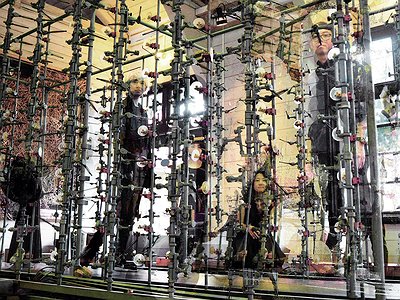Part 2
Can you talk about a breakthrough work, event or performance in your career? Why does it feel special to you? When, why and how did you start working on it, what were some of the motivations and ideas behind it?
It is so difficult to choose one, but firstly, I want to talk about my first paid job as a music composer.
For the first three years since I debuted as a member of Anoice in 2006, I had only been making and releasing music by my bands and my solo project. I took charge of the soundtracks for a contemporary film works produced by Neon O'clock Works who is a New York-based art unit in 2006 and then we held an installation performance in London in 2009. One of the visitors, Can Evgin liked my music and chose me as a music composer for his own-directed short film produced by Armani, the Italian fashion company, which played during Milan Fashion Week. I created only two songs for it, but this was the first time I composed music while synching it with the video perfectly, and it was very exciting.
After this experience, I also begun to work as a music composer for movies, documentaries, TV drama, dance, and commercial adverts. Collaborations with other artists excepting musicians are also wonderful for me.
The second is Anoice's upcoming new album 'The Hidden Forest'. As I mentioned, I have a stronger connection with nature, but this album took inspiration from 17 paintings of the forest painted by Naoko Okada, and includes 17 songs with the same title as each of the paintings, with a total length of 72 minutes.
One of the biggest features of this album production process is having used not only recording studios but also powers of nature such as forests and rivers. You may be feel as though you are standing quietly in the forest via the songs with the sounds of animals such as birds, owls, insects, and flogs and the nature such as wind, water, and squeaking trees which were sometimes recorded in a foggy forest, sometimes in a dark forest in middle of the night, and sometimes in a forest where a strong wind blew.
In addition, this album will be released not only in a normal jewel case, with a booklet containing prints of the 17 paintings by Naoko Okada, but also a box-set version which includes separate, extraordinary prints of 17 paintings. I'm so happy to realise an idea I've been working on, together with great band members, lovely guest musicians, and an especially wonderful painter. I've been wanting to make a collaboration work with nature for a long time.
There are many descriptions of the ideal state of mind for being creative. What is it like for you? What supports this ideal state of mind and what are distractions? Are there strategies to enter into this state more easily?
After I am clear about what needs to be done for a project, I usually move along with how it develops. But I let my body and brain relax at first. Lying down in a quiet forest is the best way for me. Drinking beers with my friends, playing with my wife's parents' dog and cat, talking about music with my band members, cleaning my desk and musical equipments, taking photos, and watching movies are also good, if I don't have enough time to go into the forest. I don't know why it makes me want to make so many songs, but I'll soon feel like I’m spitting out ideas.
On the other hand, office works always interrupt my creativity. I know that it is important and I should do it as the owner of my music label, but I don't like typing on a keyboard for a long time or being thrown in the overloaded information in the internet sea. However, there is something I would like to do, and there is also something I have to do for it.
Music and sounds can heal, but they can also hurt. Do you personally have experiences with either or both of these? Where do you personally see the biggest need and potential for music as a tool for healing?
I love some ambient music produced by Sigur Rós and Jóhann Jóhannsson, and often listen to them before going to bed. I also like punk music such as The Clash and Rage Against The Machine, but I have never gotten hurt by the radical lyrics. Maybe it's because I'm not good at listening to, not only English, but also any languages and also don't have an interest in the words a lot. Though I like reading artist' interviews or reviews for musical equipments.
We sometimes make slightly radical music too, though almost all the works are instrumental songs. Anoice's third album expresses the tragedy of human history and the fourth EP 'invisible wall' depicts the current coronavirus pandemic. Also, one of Anoice's side projects, RiLF's second album 'My Beloved Farewell' and another side project from Anoice, Films' third album 'signs from the past' include some songs with lyrics under the theme of loneliness or death.
Also, some of my early works by my solo project and ones from Cru that is also one of Anoice's side projects, feature a cacophony that is a harsh mixture of sounds, and they might convey a tense atmosphere and an oppressive feeling to listeners. However, non-healing-music is sometimes important for a certain type of people to solve their anger, sadness, and hate, as well as face them. Some of this kind of music may not be able to heal their pains, but at least can understand or sympathetic towards them by standing silently by their side, I think.
There is a fine line between cultural exchange and appropriation. What are your thoughts on the limits of copying, using cultural signs and symbols and the cultural/social/gender specificity of art?
I don't think about it that much. I tried to contemplate about it, but the question is too difficult for me. Anyone can enjoy, create, and share any type of art, though unfortunately, some countries and regions don't permit their people to even listen to music. But art and the sense of value for it are always changing, depending on the era.
I personally think that there is no problem if we should not forget to uphold a sense of respect for each culture or who created the work originally and also to protect their rights. But there are people who think the cultural appropriation is a serious crime even if it is legal in most countries. In a similar way, some of my music has been used as samples for some Hip-Hop songs and would have preferred if they had let me know before they use it. Of course, I don't care about it too much if it is used for love and peace.
Our sense of hearing shares intriguing connections to other senses. From your experience, what are some of the most inspiring overlaps between different senses - and what do they tell us about the way our senses work?
It depends on the individual listener's culture or their own experiences and memories, I think. It's said that Alexander Scriabin had a synesthesia between sounds and colours such as C=red, G-orange, and D=yellow. I can't feel it fpr each note seperately but on the larger scale of music. For example, I feel gentle sea waves on a piano arpeggio gently played on D major or a small local festival in my childhood on a whistle played on pentatonic scale or a Japanese bass drum.
And also, we get excited or sad according to the chords, melodies, and instrument formations. Almost all the information we as human beings can get are brought about by our visual sense, but hearing also takes an important position in what affects our emotions, I think. You can't actually perceive total silence when you're in a completely soundless environment. It's so interesting.
Art can be a purpose in its own right, but it can also directly feed back into everyday life, take on a social and political role and lead to more engagement. Can you describe your approach to art and being an artist?
I create art when I want to create art. It may sound like I'm a kind of wild spirit, but I can't explain well why I feel like creating a lot of work. Not only music but also other types of art are attractive to me.
Arts often are taken advantage of as social and political promotion materials against artists' intentions, but we should respect them more and make an effort to save their rights. I always would like to manage my own compositions by myself or to entrust them to someone who is trustworthy for me, just in case.
What can music express about life and death which words alone may not?
I can't explain this in words well, but music and its sounds is the life form itself, I think. It sometimes exudes from us and is sometimes absorbed by us, consciously or subconsciously. Of course, what and how we feel about the music depends on each culture, memories, and personality, but I think that it has something universal and powerful.
Maybe, I need to learn a lot more about geology, zoology, and ethics to explain my thought better, in order for me to answer this better some other time.






